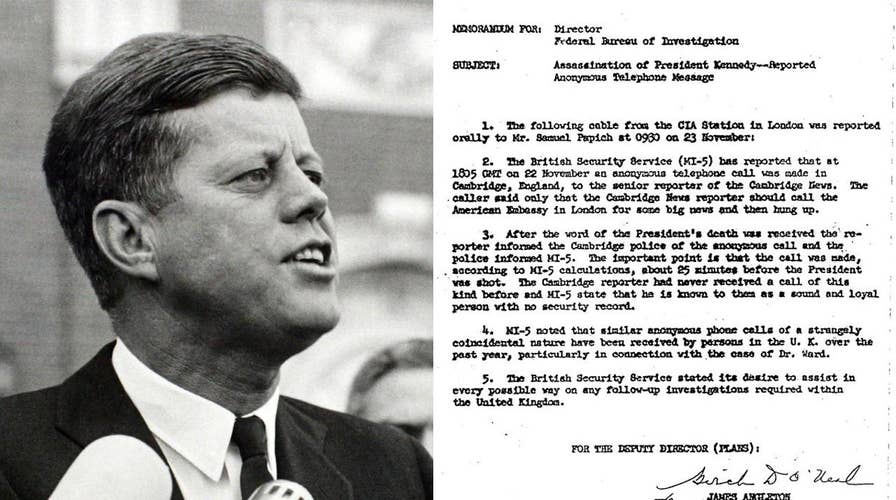JFK files: First look at records open new questions
The National Archives released over 2,800 previously secret documents related to the 1963 assassination of President John F. Kennedy. Here are some of the more interesting takeaways we know of so far from the first look at records related to Hoover, L.B.J. and Fidel Castro.
The White House released 2,800 classified files related to former President John F. Kennedy’s assassination on Thursday, but said it would temporarily keep some "sensitive" records under wraps.
The records are available at www.archives.gov. Click here to view them.
A senior administration official told reporters some sensitive documents are being held for 180 days due to concerns from some intelligence agencies. Those documents, an official said, are being reviewed by the agencies to determine whether they actually affect national security.
"I have no choice -- today -- but to accept those redactions rather than allow potentially irreversible harm to our nation's security," the president wrote in a memo released by the White House on Thursday evening ahead of the release.
The president said he is ordering agencies to review “each and every one of those redactions” over the next 180 days.
“At the end of that period, I will order the public disclosure of any information that the agencies cannot demonstrate meets the statutory standard for continued postponement of disclosure,” Trump wrote.
JFK ASSASSINATION FILES SET FOR RELEASE, BUT WHAT THEY REVEAL REMAINS A MYSTERY
Under the President John F. Kennedy Assassination Records Collection Act, the government is required to release the final batch of files on the assassination, which happened in Dallas on Nov. 22, 1963. These secret files have long fueled rumors and speculation that gunman Lee Harvey Oswald wasn’t the only person involved in Kennedy’s murder.
A CIA spokesperson told Fox News that the agency had released all but 18,000 of its more than 87,000 documents related to the assassination and promised that the outstanding records would be made available.
The spokesperson added that some of the remaining documents contained redactions that "were undertaken with the intent to protect information in the collection whose disclosure would harm national security -- including the names of CIA assets and current and former CIA officers, as well as specific intelligence methods and partnerships that remain viable to protecting the nation today."
Almost immediately after the Warren Commission in 1964 ruled that Oswald had been the lone gunman, conspiracy theories started to circulate over whether he had been the only shooter and whether the CIA had been involved in the Kennedy assassination.
But before investigators were able to fully question Oswald, the former U.S. Marine was shot and killed on Nov. 24, 1963, by Texas nightclub owner Jack Ruby – adding more fuel to the speculative fire that the U.S. government was hiding what it knew about the assassination.
The subsequent report by the Warren Commission, which was established by President Lyndon B. Johnson, did little to quell either the rumors that Oswald was killed to cover up a government conspiracy or the doubts that a lonely, alienated gunman could have fired such accurate and rapid shots.
The 1992 act, which was signed by President George H.W. Bush and required the government to release the remaining documents within 25 years’ time, also stipulated that the president is the only person who can stop any of the documents from being released.
Fox News’ Serafin Gomez, Catherine Herridge and The Associated Press contributed to this report.













































